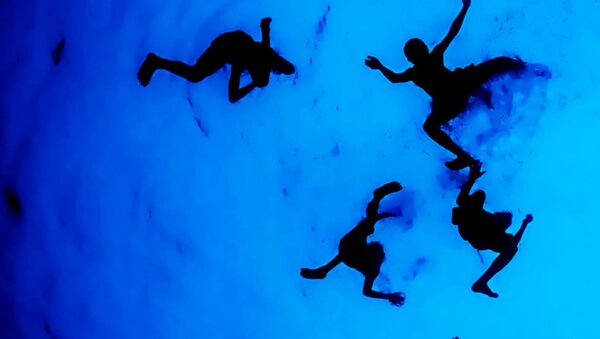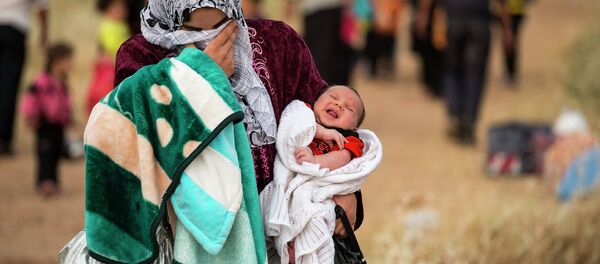UN Secretary General Ban Ki-moon, head of EU foreign policy, Federica Mogherini and Italy's Prime Minister, Matteo Renzi will step on board the Italian naval ship San Giusto off the coast of Sicily — the scene where so many migrants die.
According to the EU, officials are boarding the Italian vessel to: "Assess the situation and help ensure European solidarity for the efforts undertaken to save the lives of migrants crossing the Mediterranean Sea."
Why Boat Refugees Don't Fly! — Important insight by the wonderful @HansRosling. Watch!: https://t.co/ZnHICEySQP via @YouTube
— Melissa Fleming (@melissarfleming) April 26, 2015
The number of official meetings to discuss the crisis increases — as does the numbers of migrants who embark on a deadly journey to escape their war-torn country.
According to the UN High Commissioner for Refugees (UNHCR), numbers are also picking up as the weather conditions in the Mediterranean improve.
More than 1,750 migrants have drowned so far this year, which is the deadliest on record. Many human rights organizations and aid groups are predicting 30,000 more deaths this year if the European Union officials fail to do anything to stem the smuggling crisis.
We know what needs to be done – renew search and rescue and provide safe routes for people fleeing violence and…
Posted by Migrants Rights Network on Monday, April 27, 2015
Don Flynn, director of Migrant Rights Network says:
"We know what needs to be done — renew search and rescue and provide safe routes for people fleeing violence and persecution to escape from the predicament. Our governments should not delay any longer in taking the required action."
Zeid Ra'ad Al Hussein, United Nations human rights chief, called the European Union's migration policies "callous" and said they are turning the Mediterranean Sea into a "vast cemetery".
The European Commission backed by EU foreign and interior ministers have put forward a ten-point plan. The EU will reinforce and maritime patrolling operations with more money and equipment and extend their patrols. EU leaders say they will make a systematic effort to destroy boats used by people smugglers.
EU law enforcement, border control, asylum and prosecutors' agencies will meet regularly and work closely to gather more intelligence on how the smugglers operate. The EU will also deploy liaison officers abroad to gather more information on migratory flows and increase EU delegations.
The EU's asylum support office will deploy more teams in Italy and Greece for joint processing of asylum applications. All rescued migrants will be fingerprinted and 'emergency relocation mechanisms' will be considered, as the European Commission will begin a pilot project on resettling refugees across the EU.
A new rapid return program for 'irregular' migrants will be co-ordinated by Frontex from the EU's Mediterranean countries, whilst the EU will engage with countries surrounding Libya.
Warning – renewal of ‘fortress Europe’ policies is not the answer to the refugee crisis. Analysis from @donflynnmrn http://t.co/kUIeMn33pU
— Migrants Rights Net (@migrants_rights) April 27, 2015
Meanwhile, a move which has been criticized as an "unacceptable declaration of war to migrants and refugees" by Caritas, a church-led organization, the EU wants an international mandate for any action in Libyan waters. Britain, Germany and France are set to demand a UN Security Council resolution.
If only the EU's Frontex were as determined to rescue drowning migrants as this Greek man. http://t.co/CUZk2CBvKd pic.twitter.com/KVaf5nxBAO
— Kenneth Roth (@KenRoth) April 26, 2015
The EU's initial response to the crisis following an emergency meeting and the ten point plan put forward has been welcomed by the UN — however, it's urging for 'more comprehensive action.'
Are 1000's of African lives lost in the #mediterraneantragedy not as important to the #EU as the lives lost in the #CharlieHebdo massacre?
— Neven Hendricks (@Aspirereachbe) April 27, 2015
Maria Grazia Giammarinaro, UN Special Rapporteur on trafficking in persons and Francois Crepeau, UN Special Rapporteur on migrant human rights said in a statement:
"The decision to strengthen the capacity of transit countries to stop irregular migration on their territory, without offering long-term solutions and without adequate human rights guarantees, will only compound the abuse of migrants."
They have called on the EU to "move beyond emergency mode," and look towards mobility across the Mediterranean on its territory as "a dynamic factor of economic and social development."
"Only then will it be able to truly reclaim the control of its borders from criminal smuggling rings," the US statement concluded.



